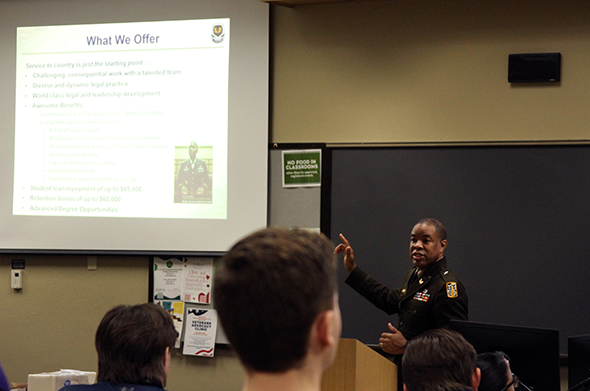Campus to Career: Army Judge Shares Insights on Success in Military Law

Over the course of a candid lunchtime conversation, U.S. Army Brigadier General Ronald Sullivan shared insights on what it is like to pursue a legal career in the military – and tips on how to launch a successful legal career regardless of one’s chosen sector.
His remarks were part of Campus to Career, a multi-month experience that brings law students an up-close look at the many ways one can successfully transition from law student life to a successful career. Speakers come from a wide range of backgrounds, each sharing insights and tips with anecdotes and humor. While Sullivan offered perspective on life as a military lawyer, much of his wisdom applied to all professional pursuits – and life in general.
Key themes were the value of mentorship, the importance of teamwork, and the difference having the right mindset can make. “Keep perspective. Be honest with yourself,” he said when asked what 3Ls should do as they look for their first job out of law school. “Know why you’re going into the office every day.”
Pursuing a legal career in military
Sullivan, who is Chief Judge of the U.S. Army Court of Appeals, gave an extensive overview of the Army Judge Advocate General’s (JAG) Corps – “the greatest and oldest law firm in the world,” a presentation slide boasted.
Consisting of thousands of judge advocates, paralegals, and other professionals, the JAG handles cases related to military justice, national security law, administrative and civil law, and contract and fiscal law. They also support soldiers and their families through trial defense and other legal services.
Sullivan touted the benefits of a military career: the challenging work, diverse and dynamic environment, generous benefits, and opportunities for advancement – as well as the intangibles that would benefit anyone’s career.
It was, for example, Sullivan’s military background that helped him cultivate a collaborative mindset that suited him well as he advanced in his career.
“We start in uniforms with no rank on them… with no names on them,” Sullivan said. “And we work together…. We run together. We get to know each other. We push each other. We compete. And no one’s bigger than someone else. And we take that to our area of practice.”
Optimizing one’s time
It was his father, also a veteran, who taught Sullivan the importance of getting a job done right over focusing on an allotted timeframe.
“My dad would tell me that we work to task, not to time,” Sullivan said.
He asked the students how long it takes to study for an exam.
“It depends,” said two students, nearly in unison, which elicited laughter from the room – given how often the phrase is uttered on campus.
“It might take ten hours, it might take two,” Sullivan continued. “But it takes as much time as it takes for you to get the information down. That’s the task. But if I told you it will take ten hours to study for your next midterm, and you do everything in six hours, I hope that you stop at six hours.”
But it can also work the other way; if it takes more than ten hours, you do what it takes to get the material down. In a military context, working to task and not to time can mean the difference between life and death.
“I don’t think any of you who paid your taxes this year want us to stop training before we’re ready to actually go out there and do our job,” Sullivan said. “And that’s what I’ll ask each of you to do in your practice of law.”
There’s more to come from Campus to Career this spring. See the full schedule and register for events.
Post date: March 6, 2023
Media contact: Kate Bradshaw
[email protected] | 727-430-1580